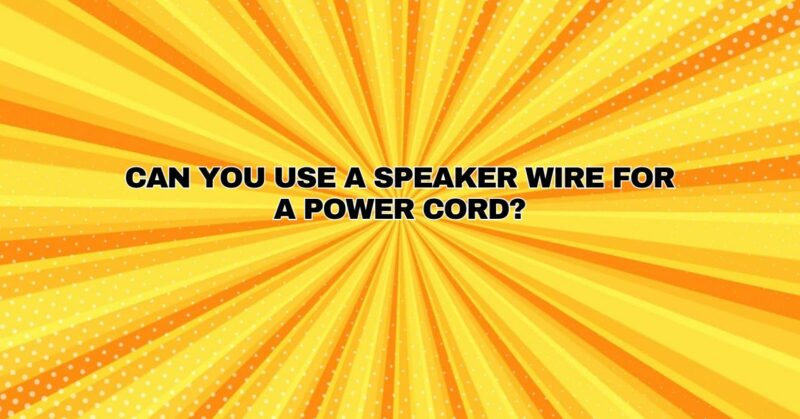In the world of electronics and electrical systems, it’s essential to understand the fundamental differences between various types of wires and cables. Speaker wire and power cords serve distinct purposes, and attempting to use speaker wire as a substitute for a power cord is not only ineffective but can also be dangerous. In this comprehensive guide, we’ll explore why you should never use speaker wire as a power cord and the potential risks associated with this practice.
Understanding Speaker Wire and Power Cords
Before we delve into the reasons behind not using speaker wire for power cords, let’s clarify the roles of these two types of wires:
Speaker Wire:
- Function: Speaker wire is specifically designed for carrying audio signals from an amplifier or receiver to speakers. It is used to transmit low-voltage audio signals.
- Conductors: Speaker wire typically consists of two conductors, usually color-coded for positive and negative connections, and is intended for relatively low current.
- Gauge: Speaker wire comes in various gauges (thicknesses), with thicker wires recommended for longer cable runs and high-powered audio systems.
Power Cord:
- Function: Power cords, also known as mains cables or power cables, are designed for delivering electrical power from an outlet to electronic devices or appliances.
- Conductors: Power cords contain multiple conductors, including hot, neutral, and ground wires, designed to handle the high-voltage and current required to power electronic equipment.
- Safety: Power cords are engineered with safety features, including insulation and shielding, to prevent electrical hazards and ensure proper grounding.
Why You Should Never Use Speaker Wire as a Power Cord
Using speaker wire as a power cord is highly discouraged and poses several significant risks:
- Electrical Hazards: Speaker wire is not designed to handle the high voltage and current that flow through power cords. Attempting to use it for this purpose can result in electrical hazards, including short circuits, overheating, and fires.
- Insufficient Insulation: Speaker wire typically lacks the robust insulation and shielding necessary to safely contain the high-voltage electrical current found in power cords. This can lead to exposed conductors and electrical shocks.
- Inadequate Grounding: Power cords include a ground wire designed to provide a safe path for electrical faults. Speaker wire lacks this important safety feature, increasing the risk of electrical accidents.
- Overheating: Using speaker wire for power delivery can cause the wire to overheat due to the higher current demand. Overheating can lead to melting insulation, fire hazards, and equipment damage.
- Code Violations: Using speaker wire as a power cord may violate electrical codes and regulations in many regions, which could result in legal consequences or insurance issues in case of accidents.
Safe Practices for Power Delivery
To ensure the safe and proper delivery of electrical power to your devices and equipment, follow these guidelines:
- Use Appropriate Power Cords: Always use dedicated power cords designed for the specific devices or appliances you intend to connect. Ensure that these cords are in good condition and properly rated for the intended application.
- Avoid Modifications: Do not attempt to modify or alter power cords, as this can compromise their safety and performance.
- Inspect Regularly: Periodically inspect power cords for damage, wear, or fraying, and replace any damaged cords immediately.
- Ground Properly: Ensure that power cords are properly grounded, especially for devices that require grounding for safety reasons.
- Follow Electrical Codes: Adhere to local electrical codes and regulations to ensure the safe installation and use of power cords and electrical equipment.
- Consult Professionals: If you have any doubts or questions about electrical safety, consult with qualified electricians or professionals with expertise in electrical systems.
Conclusion: Prioritizing Safety
In conclusion, using speaker wire as a substitute for a power cord is not only ineffective but extremely unsafe. The differences in design, insulation, and voltage-handling capabilities between these two types of wires make it essential to use them for their intended purposes. Prioritizing safety when dealing with electrical systems and equipment should always be the primary concern, as the consequences of improper wiring can be severe, including electrical accidents and fire hazards.


